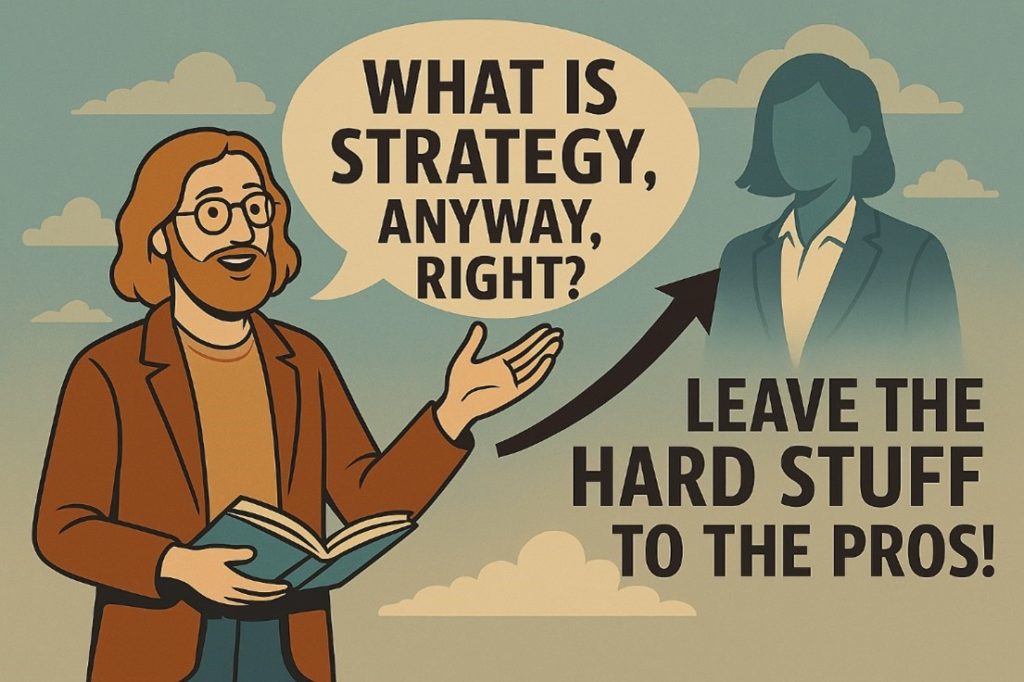
Summary
Our paper published in Journal of Management Studies argues that voluntary participants in Open Strategy initiatives need to deal with an important challenge. On the one hand, they are confronted with ambiguous and elusive role requirements (‘What is strategy anyway, right?’). Yet, on the other, they are expected to excel at this role in order to have impact; by their peers, senior managers and professional strategists (‘Leave the hard stuff to the pros!’). If this sounds like a problem, it’s because it is! Getting this strategy role right is not just crucial for part-time strategists, but also for organizations seeking to benefit from participative forms of management.
Strategy participation involves micro-role transitions
While ‘strategy’ has traditionally been the domain of corporate elites, a huge volume of empirical research has shown that the world is much more complicated. There is ample evidence that strategic decisions are shaped by people from different walks of life, including middle managers, shop floor workers and even people at other organizations. Indeed, a number of studies show the potential positive effects of opening up the strategy process. A consequence of this is that people engage in strategy work in addition to functional roles, be it as Accountants, Engineers or Software Developers. To participate in strategy work, therefore, these people need to temporarily disengage from this role and enter the strategy domain. Prior research (e.g. Ashforth) calls such moves ‘micro-role transitions’.
How did we study such micro-role transitions?
To study micro-role transitions we followed 22 employees of a large telecommunications firm (‘TELCO’) over time as they participated in an Online Open Strategy Community. The setting implies that participation happened via written posts as well as comments to such posts. In addition, we also collected interviews with participants as well as professional strategists. The purpose of this community as well as the role of participants remained opaque and thus required participants fill this role with meaning.
What is interesting about micro-role transitions in Open Strategy?
Our paper sheds light on the process of micro-role transitions, as well as the characteristics of the strategy role that emerges over time. While one might assume that participation in an online company forum constitutes a ‘low risk’ environment, this was not how participants saw it. Most felt that they lacked the capability and credibility to be part of what they perceived as a distinguished community. To overcome these barriers and enter the strategy role, participants used two distinct discursive tactics. On the one hand, they used ‘downplaying tactics’ in order to lower the perceived stakes and avoid rejection by others. For instance, they did this by framing contribution as a novice opinion. On the other, they used ‘justifying tactics’ by, for instance, drawing on technical expertise to legitimize their claims.
Alongside these tactics, participants also worked to define what this ambiguous strategy role should look like. They did this via ‘idealizing tactics’. These tactics consist of moralized discourses through which participants created an ‘ideal’ picture of strategy. In this particular case, this implied a commitment to the greater good rather than a commercial view of strategy. What is more, these idealizing tactics constituted a form of ‘role distance’. It allowed participants to maintain their autonomy and not be overly determined by either their ‘day job’, nor the role of professional corporate strategists. Over time, this idealized notion of strategy work prevailed.
Why did this approach to strategy work prevail?
Our analysis reveals that idealized interpretations of strategy gained momentum on the forum. They received applause in the form of reassuring comments. Over time, we see an increase in the use of idealizing tactics across the most active participants. However and crucially, professional strategists and senior managers (who mostly did not post themselves) were highly critical of how participants played their role and the unusual, idealistic strategic options that were proposed. This limited the impact of participants on the strategic direction of the firm (although a number of proposals, such as the advent of AI or autonomous drones proved to be spot on for the telecommunications industry).
And, what are the implications?
Our findings have substantial implications for theory, but also the practice of strategy making. Future research will benefit from theorizing participation as a form of micro-role transition. Management practice benefits from insights into reasons for the efficacy of participative forms of management. Such efficacy ultimately depends on the ability of participants (‘part-time strategists) to frame issues such that they connect and resonate with corporate challenges as considered by established decision-makers.
More broadly, our paper uncovers a core dilemma of participative strategy initiatives. New voices bring fresh strategic ideas that could open up new avenues for companies. But, these ideas are also more likely to be dismissed, because they don’t align with established ways of working or feel too far out. On the flip side, more conventional ideas are more likely to be taken seriously, but they rarely push the company in new directions.
So, what’s needed? Not just openness to more people in strategy conversations, but also openness to the kinds of ideas they bring. At the same time, it’s a two-way street: it also takes effort from part-time strategists to connect their ideas to the existing strategy conversation.

0 Comments